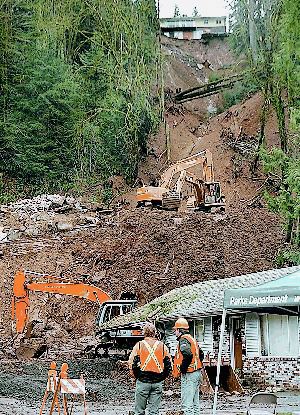Study cites higher building costs to meet future ‘green’ codes
Stuart Hunter
Province

Landslides, such as this one in North Vancouver in January 2005, are an example of the impact climate change can have on property values, according to a report commissioned by the Real Estate Institute of B.C. Photograph by : Wayne Leidenfrost, The Province
Climate change could affect the design and location of new real-estate developments — and substantially alter prices in B.C., says a new report from the David Suzuki Foundation.
The study, entitled Hot Properties: How Global Warming Could Transform B.C.’s Real Estate Sector, says changes in purchasing behaviour, new government regulations and the way insurers assess risks will affect new developments and could also alter property values.
The 27-page report, commissioned by the Real Estate Institute of B.C., was prepared by Nicholas Heap, the foundation’s climate and energy policy analyst.
“The Real Estate Institute of British Columbia has been concerned about the issue of sustainability for some time, and climate change, as we are all starting to realize, will force real-estate
professionals to find innovative ways to reduce greenhouse emissions,” REIBC president Scott Ullrich said in a news release.
“B.C. is already a North American leader in the fields of green buildings and sustainable development, and the institute hopes to build on that.”
Some of the effects expected are an increase in building costs in the short term as “new standards for increased resilience and increased requirements for energy-efficiency in buildings take effect, a shift toward more compact, less land-intensive forms of development and a continued acceleration in market demand for green buildings.”
Some examples of how climate can effect buildings include homes flooded in Tsawwassen, houses burned by the Kelowna wildfires and homes in Mission and North Vancouver hit by landslides.
The report was presented last week at the real estate institute’s conference in Whistler.
© The Vancouver Province 2007

